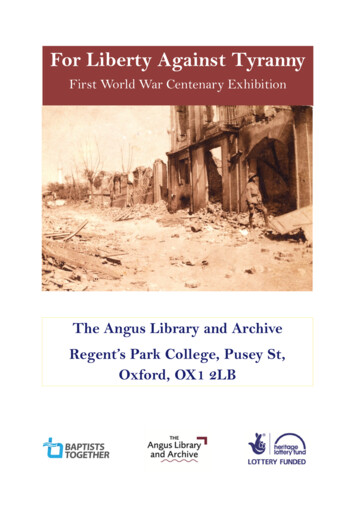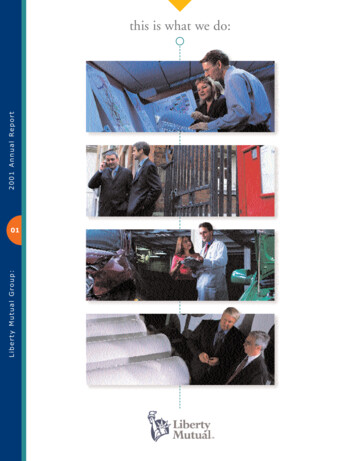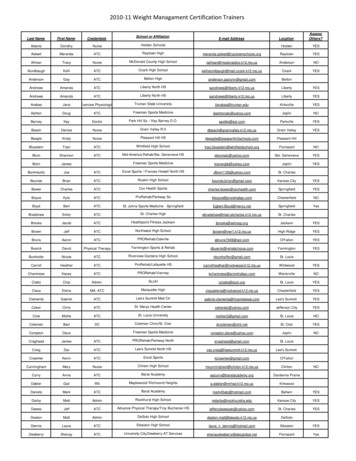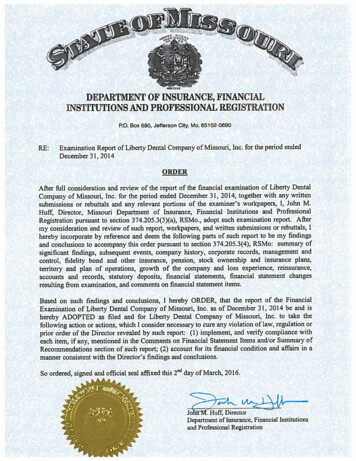
Transcription
For Liberty Against TyrannyFirst World War Centenary ExhibitionThe Angus Library and ArchiveRegent’s Park College, Pusey St,Oxford, OX1 2LB
The world of the early twentieth century shook in August 1914, thetremors extending to the Baptist faith. Despite earlier efforts tosupport international peace, Baptists soon backed the war effort. Thefaith declared itself against the evil of the Central Powers; ‘ForLiberty Against Tyranny’ seeks to tell their story. Phrasingthemselves in moral terms, Baptists were a key part of the wider wareffort, putting aside their qualms about warfare to fight at the frontsor to serve as chaplains in the trenches, while those at home made aconcerted effort to support the British campaign against ntsandphotographs that bring to light a less famous, but no less importantnarrative of an infamous war.
Prior to the outbreak of the First World War, there were calls for theChurches of the world to unite in working towards global peace. In the daysbefore Germany declared war, unaware of the looming threat of conflict,representatives from European Churches planned to meet in Constance,Germany, at The Church Peace Congress. Revd J. H. Rushbrooke was onesuch delegate.1. Revd J. H. Rushbrooke’s personal correspondence includingpostcards from Berlin, Jershöft and Osnabrück to London, July 1914Rushbrooke was married to Dorothea Gertrud Weber, daughter of theGerman painter, Professor Anton Weber. Twice in Rushbrooke andDorothea’s married life they lived through the trauma of England andGermany being at war. In the weeks just before the outbreak of the FirstWorld War, Dorothea and their daughter were traveling ahead ofRushbrooke to Germany with plans to meet after The Church PeaceCongress. Dorothea’s postcards suggest that she saw no sign of the troublesahead.
Extracts from correspondence between Dorothea and Rushbrooke15.7.14 from Germany (Osnabrück) to London‘My darling, until now the journey is really good. The sea is calm. Alone inthe cabin. No problems with the customs, but it is extremely hot. The childis very good, she is sleeping now. On top of the ship she couldn’t sleep much[.] If the time would pass by faster. A kiss from everyone.’15.7.14 from Berlin to London‘Now we sit here and are going to have dinner. The room is very nice. Thelittle girl is already washed, fed and in bed. She was so extremely sleepyduring the journey, it was so hot. We all thought it took a very long timedespite the train’s punctuality. Though it was very nice, we were the wholetime alone. How are you? Did you get a cold? Here is real terrific Germanheat, but Berlin is beautiful. It is so clean and the motors are so absolutelynoiseless. Everything is alright. It would be so nice to have you here.’16.7.14 from Berlin to London‘My Dear, we are so comfortable together here, Holla, Hans, Rudi,Marianne, Margret, Susi.I tell you, it is great. Would you be here you poorabandonee, we are so happy together. Everyone is sending you best wishes.’21.7.14 from Jershöft (Baltic Sea, since 1st October 1945) to London‘My Dear today is Susi’s birthday, we are so happy together and the weatheris great. Would you like to swim in the sea with Margret? [.]I have yourblue pants here, could you get one or should I send it? Please bring thechild’s overall with you but take the label off. Your lovely letter just arrived.Thank you so much. [.] Please write to Susi’s friend on the day of yourdeparture, he can help you to get away that night. Never ending love.’22.7.14 from Jershöft to London‘Well actually I have nothing to write about today, my dear. We are living ina situation right now where nothing happens. I hope I have packed all ofyour things properly. Don’t forget your slippers, 2 pairs of boots. Yourjacket is in your closet. The trouser is already in the bag[.]The people arecurrently very elegant here ’
2. Cancelled Passport, Emergency Passport andTravel Documents issued to Revd J. H.Rushbrooke at the outbreak of the First WorldWarAfter The Church Peace Congress at Constance,Germany was adjourned due to building hostilities,Rushbrooke attempted to travel across Germany tomeet his wife and daughter. He sent a telegram tohis wife to say that he’d reached Schlawe safely, butwhen leaving the Post Office was arrested by aminor German official under suspicion of espionage.He was released after two days in a prison cell.Rushbrooke eventually met with his wife and daughter, but the family weredetained in Germany for several weeks after the outbreak of war. Writing tohis congregation in Hampstead Garden Suburb, Rushbrooke stated:Perhaps the shock of this war has fallen on few as heavily as upon me, whohad toiled for years on behalf of friendly relations between two nearly-relatedpeoples, and had believed that the Christian faith was strong enough toovercome the suspicions and jealousies that make for war.After securing an emergency passport issued by the American Embassy,Rushbrooke and his family were finally able to return home in October ofthat year.
3a. ‘What made Germany go to War’Revd J. H. Rushbrooke, November 12th 1915A handwritten lecture presenting Rushbrooke’s opinion on the factors thatled to the outbreak of war in 1914. The address highlights changes in therelationship between British and German Baptists and Rushbrooke suggeststhat the German Church had become invariably political, allowing the powerof the state to increase. Rushbrooke’s words also demonstrate Baptistjustification of war including claims that the German political system at theoutbreak of war was ‘the negation of God.’3b. ‘The Baptists of Great Britain and Ireland: To the brethren of ourfaith and order in Sweden’Revd J. H. Rushbrooke, April 1917Once war had been declared, Baptist leaders and their congregations were,in general, supportive of the position of the British government. In this handdrafted address to brethren in Sweden, Rushbrooke claimed that Baptistsstood for peace, goodwill and brotherhood in social and internationalrelations as well as in the Church and that Germany’s violation of theseprinciples convinced many of the righteousness of the British cause.Rushbrooke justifies his argument by illustrating Germany’s apparentdetermination to incite war in Europe and by highlighting the unacceptabletreatment of the Belgian people at the hands of the German army. InRushbrooke’s words:Lovers of peace as we were and are, we Baptists are not committed to aQuaker doctrine of non-resistance, still less to the position that we ought tostand aside and permit the weak to be overwhelmed by the strong.
4. Letters in response to Revd J. H. RushbrookeThese two letters written by members of the public are just an example ofmany such messages received by Rushbrooke after his return from Germany.It is clear that not everyone shared the opinions of the Baptist leader. Whilea German girl is grateful of Rushbrooke’s sympathetic and open-mindedattitude towards the German people, others such as H. W. O’Keefewholeheartedly disagree; perhaps an indication of wider support for the waramong the British public.
5a. A Message from the Baptist Union of Great Britain and Ireland tothe Baptists of the United States of America, May 2nd 1917‘A Message ’ was written for distribution throughout the United States.The British and Irish Baptists hoped for a sympathetic and active responsefrom loyal American Baptists. The message was written with overtones ofcheer and hoped to reaffirm a united spirit among all Baptists.The document reads:Dear Brethren, we know not when this day of strife will end, but howeverlong it may last and however chequered may be its course, our fellowshipwith one another will be an increasing satisfaction, and the assurance of ourunity in faith and aim, in effort and in hope will be an unfailing fountain ofstrength and joy. We are stronger because you are at our side, and we shallmarch with surer feet and braver heart because we march together to the newheavens and the new earth in which righteousness and peace shall dwell, notas occasional visitors, but as perpetual guests.
5b. Letters from American Baptist MinistersW. Y. Fullerton, August 1917In acknowledging receipt of a pamphlet copy of ‘A Message from the BaptistUnion of Great Britain ’ a number of American Baptist Ministers repliedwith strong commendations, expressing a profound sense of theresponsibility of a nation to fight by the side of the Allies. Responsesincluded:The unselfish attitude of the British people in this frightful war at suchterrible cost is magnificent. We American Baptists rejoice that our people haveentered the war to share the service and cost of securing for mankind thedestruction of this wicked attempt at Germanizing the world Carefully-prepared addresses in these lines are just what our country needs toawaken the patriotism of the many that have not as yet come to take in ‘thefull’ meaning of the world war.The fraternal and cosmopolitan message from the Baptists of Great Britainand Ireland will surely find a sympathetic and mighty response in the heart ofevery loyal American Baptist.5c. Letter and photographs from C. C. Bateman responding to ‘Amessage from the Baptist Union of Great Britain and Ireland to theBaptists of the United States of America’, July 14th 1917Bateman’s letter is just oneexample of the supportivereplies to ‘A Message fromthe Baptist Union of GreatBritain ’ The letter with thephotographs of Batemanshows his pride in the strongconnection between American and British Baptists,and his desire to assist in the ‘stupendous struggleof democracy against the most barbarous andbrutal autocracy this planet has ever known’.
6. Letter from the Rt. Hon.Lloyd George on theoccasion of the opening ofthe Percy IllingworthInstitute, July 14th 1916Baptist leaders were notisolated from the politicalworld and their opinions wereheard by a wide audience of influential characters. In this personal letter to J.H. Shakespeare, General Secretary of the Baptist Union, the Secretary ofState for War, David Lloyd George, sends apologies for his absence at theopening of the Percy Illingworth Institute due to the presence of foreignministers in parliament on ‘urgent business connected with this terrible war.’7. 10th West Yorkshire RegimentMen of the 10th WestYorkshire Regimentwith their mascot, agoat. A huge numberfrom the 10th WestYorks were killed at theopening of the SommeOffensive in July 1916;it is believed that thisregiment suffered thelargest casualties for asingle battalion on thefirst day of the Somme.Faith played an important role in the lives of many men serving in the armedforces. The 10th West Yorks were under the care of the Rev. William CrambCharteris. Cramb survived the war and later returned to his congregation inAyr, Scotland.
8. Some Chaplains in KhakiF. C. Spurr, c.1916It was during the First World War that the Free Churches received officialdenominational acknowledgment from the War Office and Baptist chaplainsalong with other Free Church denominations were appointed to providetheir services as part of the armed forces. Spurr’s volume provides personalaccounts of the experiences of Baptist chaplains serving in the war and givessome insight into what men experienced on the front line.9. With Our Fighting Men: The Story oftheir Faith, Courage, Endurance in TheGreat WarThe Revd W. E. Sellers, 1915Along with thousands of young men acrossBritain, Baptist men enlisted to fight for theircountry. By November 1914, J. H.Shakespeare had been informed of at least13,255 recruits. With Our Fighting Men tellsthe story of Christian soldiers during the war.
10. The Christian Soldier’s EquipmentRevd William Thomas, c.1915While many of the Christian denominations were not opposed to menfighting in the war, they were concerned with maintaining the morality ofmen in service. The Christian Soldier’s Equipment was written as a companionfor Christian teachers to carry with them on the field. It teaches of thespiritual armour that a Christian solider carries with him through his faithand the ways in which a solider could prepare for ‘spiritual warfare’.11. ‘The Panoply of God: Address to British Soldiers in the DoeberitzPrisoner-of-War Camp’The Revd J. H. Rushbrooke, October 4th 1914This is a handwritten draft of Rushbrooke’s address to British soldiersdetained at the Doeberitz Prisoner of War Camp soon after the outbreak ofthe war. Rushbrooke explains the ‘Christian Soldier’s Equipment’ and theways in which faith can help men at war by providing them with a spiritualarmour. In a more practical note, Rushbrooke reminds the men that they arerepresenting their country in a foreign land; they are encouraged to pursuenoble living and uphold good Christian morals.
12. Letter to The Revd J. H. Rushbrooke from the Parents of Private R.W. Dulley, 29th October 1914For many parents, the war years were a time of worry, uncertainty andsorrow as shown by this letter sent to Rushbrooke from the parents ofPrivate Robert W. Dulley asking for news of conditions at Doebertz prisonerof war camp where their son was held.13. Memoirs of Ministers and Missionaries, 1917-19The First World War was the first time that Baptist chaplains served in theBritish Armed Forces with commissioned rank and on the same terms aschaplains from other churches. As a direct result of the conflict, six Baptistchaplains lost their lives, some of whom and are listed in these Memoirs.Chaplains across the denominations had a number of roles, including:helping out in canteens, tending the wounded, or writing to widows andother relatives informing them of the loss of a loved one. Before the war,Communion was practised once a month, but during the war it was practisedwhenever possible and held at least once a week.
14. The King's High WayJohn Oxenham, 1916This little book of war poetry reflects the fears, hopesand efforts of the people at home in Britain. During atime when everyone at home and abroad was caught upin war, Oxenham stated, ‘if war brings out the veryworst in human nature it offers opportunity also forthe display of the very best.’15a. Diaries belonging to Ernest Payne, 1917-18When war broke out in 1914, future BU secretary, Ernest Alexander Paynewas 12 years old. His diaries show how everyday life continued at home andthe diaries entries often mention school work and holiday activities.However, the ongoing war remained at the forefront of his mind and Ernestdocumented the daily air raids and the comings and goings of peers who lefthome to fight.15b. Scrapbook belonging to Ernest Payne, 1914-16The young Payne also kept a scrapbook of newspaper cuttings relating tothe war, the volume on display covering the period from October 1914 toJanuary 1916.
16. Regent’s Park College Minute Book, 1902-20From 1916 to 1920 Regent’s Park College loaned its premises, then inLondon, to St Dunstan’s Hostel for Rehabilitating Blinded Soldiers andSailors. Support for the move came from Revd J. H. Shakespeare and DavidLloyd George. The college moved in with Hackney College which was latercommandeered for the use of the Royal Flying Corps in 1918. These thenjoined New College which led to a scheme of united theological classes forthe colleges in 1919.17. Letter from St Mary's Gate Baptist Church regarding charitablework, 28th October 1914Across Britain people wanted to be part of the war effort. Those who couldnot fight found other ways to contribute. The role of women changeddramatically as they entered the workforce into positions previously held bymen. Fundraising and charitable work was also prolific and varied. In thisletter from St Mary’s Gate Baptist Church, T. S. informs Rushbrooke thatmoney was raised to furnish a house for Belgian refugees and support theLadies’ Working Party for War Relief.
18. The Second Century ofBaptist Foreign MissionsWilliam B. Lipphard, 1926Lipphard recognised the cost ofthe war to humankind. Hequotes figures from the Leagueof Nations which state that 10million were killed, 20 millionwounded and 5 milliontraumatised. Sufferinghappened in many ways; food prices rose, building materials doubled in priceas did the cost of travel. In Germany, people lived off turnips in the last yearof the war and babies perished through lack of milk. Lipphard saw thatmissionary work was vital after the war just as much during it. Lipphardsuggests that preaching the gospel, relieving human suffering, and trainingnew missionaries was vital. He also recognised that new missionaryobjectives were needed to tackle the industrial strife, social turmoil, racialprejudice and intellectual unrest which came from the conflict.19. The TimesWar Atlas andGazetteer, 1917Bound volume of40 coloured mapsof the war areasincludingstatistics relatingto the Belligerentcountiesincluding areaand population.
20. The Rally of the Empire, published inthe Baptist Times, 1915This leaflet was included in an edition of theBaptist Times in 1915 and depicts the wideranging effect of the First World War. Trulythe first global conflict, the leaflet showstroops from all over the British Empirerallying to war, illustrating the numeroustheatres of war involved in the conflict.21. Salonika, Greece,photograph album,Frances Major, 1916 -17At the request of the GreekPrime Minister, in October1915 a two large French andBritish brigades landed atSalonika to help the Serbs intheir fight against Bulgarianaggression . Frances Majorwas a British nurse from Swindon, who served with the armed forces duringthe First World War. Thisphotograph album documentstwo years spent in Salonika,including images of medical staff,soldiers and ruins of buildings.Whilst many of the images showthe devastating effects of war,there are also heart-warmingimages which depict thefriendships which were builtbetween the nurses.
22. ‘The Latest War News’ photographalbum from India, 1914This photograph is in an album whichdocuments mission life in India. The imageon the left shows locals gathered to hearthe ‘latest war news’ in 1914 anddemonstrates the far reaching significanceof the war across the globe.Limited, unreliable, and delayed means ofcommunication during the war meant thatscenes like these would have been frequenton further afield areas of the Britishcolonies.23. Dr Ellen Farrer’s diaries, 1914-19Dr Ellen Farrar was a pioneer female doctor who set sail for India in 1891.She worked in a missionary hospital in Bhiwani. Extracts from her diariesgive an insight into how her daily life was affected by war. From herconcern for soldiers’ cold and sockless feet, to her keen interest in thedissemination of war newsthrough the newspapers andcinema, and her constantanxiety of friends beingwounded or killed. Dr EllenFarrer’s strong resolve andability to find pleasure inthe joy of receiving postfrom loved ones creates apersonal and moving pictureof a British Baptistexperiencing war far from home.
24. The War and ForeignMissionsThe Revd Neville Talbot,c.1915In The War and ForeignMissions, the Revd NevilleTalbot recognises that theworld was changing quicklyduring the war. Nevilleurgently sought former soldiersto become missionaries andtravel. He believed these men would benefit from passing on Christian beliefsin exchange for learning far eastern values for the benefit of mankind.Neville realised that if we did not learn respect for other values and culturesthen there would be a larger war than the First World War.25. ‘1914 - 1918’, I. M. A, Christmas1918This poem was written to commemoratethe end of the war. Its unknown authorcites the suffering of the conflict, and thefear that ‘Right’ (the Allies) would becrushed by ‘Might’ (the Central Powers);however, the overall message of the poemis that it is God that has ensured thevictory of the Allies, and that meaningthrough faith has survived the horrors ofwar.
26. After the War: an Opportunity forSoldiersThe Revd Edward S. WoodThis pamphlet created by the Revd E. S.Wood, chaplain of the Royal Military Collegeat Sandhurst, is encouraging soldiers to takeup mission work after finishing their servicein the armed forces.27. The Position and Progress of the Baptist Denomination in EuropeRevd J. H. Rushbrooke, 1923The lasting impacts of the war can be seen in the actions taken by Baptistorganisations in the years following the signing of the armistice. The mainconcerns at a conference of the Baptist World Alliance in July 1920 were toensure a lasting peace in Europe, rebuild relationships with Germany andensure that churches in war-torn countries had the material necessary tocontinue their work.In July 1923, at the Baptist World Alliance Third World Congress inStockholm, Rushbrooke delivered this hopeful message:I rejoice in the knowledge that the need in Europe is far less than it was.Slowly, painfully slowly, normal conditions of life are emerging; but it will benecessary whilst in Stockholm to confer with the brethren of certain lands, andespecially of Russia and Germany, regarding the conditions likely to obtain inthe near future.
Online exhibitions, details of upcoming exhibitions held by The Angusand any accompanying talks can be found on our om/angus.regentsWith funding from the Heritage Lottery Fundand The Baptist Union Newington Court Fund,we would like to see more people from a widercross section of society using The Angus. Weaim to help people engage with the heritage ofthe nation and the Baptist denomination, takingadvantage of the true value of this wonderfulcollection.Curated by Sukie Trowles, David Cox, Lucy Clarke,Vikki Hawkins, Sabrina Smelz and Morgan HarriesKatie Pearce, Learning and Participation OfficerEmma Walsh, College LibrarianAnja Clark, Project AdministratorAnna James, Antiquarian CataloguerLucy Kelsall, CataloguerPhotography by Amanda Sharp, Andy Paterson and Katie Pearce
Liberty Against Tyranny' seeks to tell their story. Phrasing themselves in moral terms, Baptists were a key part of the wider war effort, putting aside their qualms about warfare to fight at the fronts or to serve as chaplains in the trenches, while those at home made a concerted effort to support the British campaign against tyranny.










